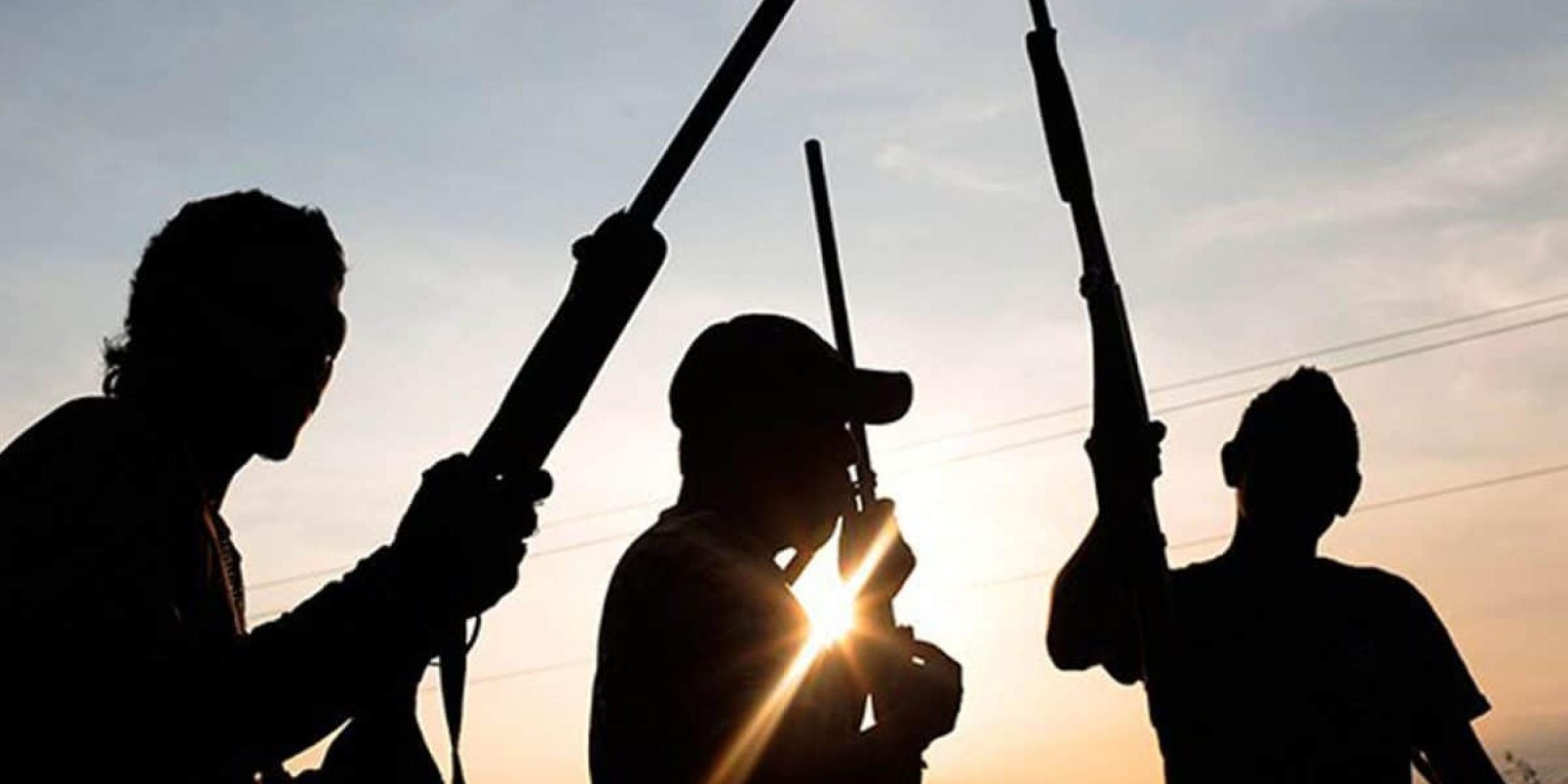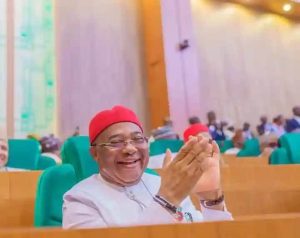We Heard Gunshots on Our Farm Around 2 PM; My Only Son Was Shot Dead – Enugu Widow Recounts How Fulani Herdsmen Killed University Graduate in Fresh Attack
Ttragedy struck in Ndiagu Amofia Umuhu village, Eha-Amufu, Isi-Uzu LGA, Enugu State, when Mrs. Oreku Odogbunwebe, a widow, lost her only son, Deacon Donatus Ndubuisi, in a gruesome attack by Fulani herdsmen. In an emotional interview with SaharaReporters, Oreku recounted the horrifying events of that fateful day, narrating how her son, fondly called “Ofunwa,” was murdered while visiting her on the farm.
It was a peaceful morning when Ndubuisi, a university graduate who was preparing to serve his country through the National Youth Service Corps (NYSC), arrived at his mother’s home. After spending time away in Enugu metropolis for his studies, he returned to his mother’s village in Ndiagu Amofia Umuhu, Eha-Amufu, to spend the weekend and assist her with some household chores. His mother, Oreku, recalled how they had spent the early part of the day harvesting cassava, yam, and cowpeas from their farm, a routine activity they both enjoyed together.
However, as they worked in the fields, the sound of gunshots filled the air, distant at first, then closer. “At first, we didn’t think much of it,” Oreku explained. “It sounded far away, but the gunshots soon grew louder, closer, and more frequent.” Little did they know that their peaceful world would soon be shattered by violence.
While working on the farm, the sound of the gunfire seemed to get nearer, and before long, a bullet struck Ndubuisi’s uncle, who was working in a nearby palm plantation. According to Oreku, the situation quickly escalated. “The next thing we knew, we heard a loud shout from my son. He cried out in a loud voice, ‘Jesus!’” Oreku said. “That was when the realization hit—there were attackers, and we were in immediate danger.”
In the midst of the chaos, Oreku and her son ran in separate directions, unsure where the gunshots were coming from. “I didn’t know that they had already shot him,” Oreku tearfully recalled. “I ran in one direction while he ran in another, trying to seek safety. But by the time the attackers had left, I couldn’t find him.”
After the attackers had disappeared into the bush, Oreku, in a panic, started calling out for her son, thinking that if he heard her voice, he might come out of hiding. She searched frantically, but her calls went unanswered. As time passed, it became clear that her son was not in the area.
After a few hours, Oreku went to her brother, Osita, to tell him that she couldn’t find her son. Osita immediately alerted the entire village, and a search party was formed. Oreku said, “They searched everywhere. It wasn’t long before they found my son’s lifeless body. He had been shot dead.”
The grief-stricken widow struggled to hold back tears as she recalled the moment when her worst fears were confirmed. “My only son, the one who had always been my comfort, had been taken away from me,” she said. “He was all I had, and now he’s gone. My lineage, and his father’s lineage, have ended because he was my only child. This is why I have refused to be consoled.”
Oreku’s pain was palpable as she spoke about the man her son had been. “Ndubuisi was a kind and hardworking young man. He had just graduated from university, and he was preparing for his National Youth Service,” she said. “He was also a skilled photographer and electrician, and I was so proud of him. He was everything to me. He helped me in ways that no one else could, and now he’s gone. I have nothing left.”
Oreku revealed that, despite the tragedy, she still harbors regrets. “Before he left for the farm that morning, I asked him if he would be going back to town that day, but he told me he would return in the evening,” she recounted. “He was supposed to leave in the afternoon, but he agreed to stay with me for the day, as I asked him. That was the last time I saw him alive.”
As a mother, Oreku tried to prepare for the future, but she never anticipated that her son’s life would be violently taken away. “I had told him to get married so that I could nurse his children while I am still strong, but he always said he couldn’t marry yet. He said there was no one to support him, and we had no help,” Oreku said. “Now, I will never get to nurse his children, and I feel as if my life is over.”
The loss of Ndubuisi not only impacted his mother, but also his extended family and the wider community. Oreku reflected on how her son was an integral part of the village and how his death has created a void that cannot be filled. “He was not a troublemaker,” she emphasized. “He always focused on his education and his work. When he returned home, he helped me in every way he could, and now, he’s gone. I’ve lost everything.”
The tragedy is compounded by the fact that Ndubuisi was the only child of both his mother and father, leaving the family’s lineage to come to an abrupt end. “My own lineage, and his father’s lineage, have just closed. He was the only child of his father, and I have no other child to turn to now,” she lamented.
Oreku firmly believes that Fulani herdsmen were responsible for her son’s death. “I didn’t know the attackers personally, but it was clear from the way they behaved that they were Fulani herdsmen,” she said. “The chairman of our settlement also confirmed that they were the ones who killed my son, as they were seen during the attack.”
According to Oreku, the herdsmen had been coming to the area to drink water from the Ebe Onuku River, but this was the first time they had ventured beyond the river into the village. “They didn’t live in our village; they came from Agala land in Benue State,” she explained.
In addition to killing her son, the attackers also set fire to Ndubuisi’s house. “His nursing wife saw them when they invaded the house, wielding AK-47 rifles, and they forced her to flee. They looted everything in the house, leaving us with nothing,” Oreku added. “They took everything from us, and now, I’m left with nothing but memories of my son.”
As she grapples with the loss of her son, Oreku has made an urgent plea for the government to take action. “I want the government to build a house for me because I am now squatting in someone else’s house,” she said. “I have nothing left. My son was the only one who had been supporting me. I was doing menial jobs to support his education, and now, I am left with nothing.”
Oreku expressed frustration with the government’s response to the incident, stating that officials had visited her, but their focus seemed to be on confirming that the attackers were indeed Fulani herdsmen. “They came to ask me if I knew the attackers, but they didn’t bring any food or assistance. They just wanted to know who they were,” she said. “This is the government’s response? No one has offered me any real help.”
The incident has sparked anger and frustration within the community, as residents feel abandoned by both the government and security forces. “Why didn’t the government act sooner to prevent this from happening? Why have they not done more to protect us?” Oreku and other villagers are asking.
For Oreku, justice for her son may never come. “The government promised to investigate, but for me, it may be too little, too late,” she said. “I will never see my son again. He was my only source of support, and now I am alone. I am going to die of hunger because I have nothing left.”
Her heartbreaking story is a stark reminder of the deep insecurity and violence that continue to plague many rural communities in Nigeria. While some organizations are providing assistance, much more needs to be done to address the root causes of this violence and prevent further loss of life.
The tragic death of Ndubuisi has left his mother, Oreku, heartbroken and abandoned. She is left to mourn the loss of her son, the only one she had, and to struggle with the overwhelming grief that comes from losing a child in such a brutal and senseless manner. Her story highlights the ongoing violence in the region and the failure of the government to protect vulnerable communities from such attacks. While promises have been made, it remains to be seen whether the government will take meaningful action to ensure that justice is served and that the safety of citizens is prioritized.
Source: SR






Astrophysical modeling! AI Image simulates black holes. This AI Image visualizes cosmic phenomena!